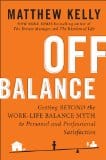Book review: Off Balance
This blog is reader-supported. When you purchase something through an affiliate link on this site, I may earn some coffee money. Thanks! Learn more.
Read our review guidelines.
Matthew Kelly found out he had cancer aged 35 and started re-evaluating what was really important. Off Balance is the result. It’s a book about work-life balance, but it’s not the normal time management stuff.
Kelly frowns on the modern-day culture of individualism, hedonism and minimalism. He proposes instead that you strive to become the best possible version of yourself, live a virtuous life, and exercise self-control.
He asks whether we actually want work-life balance. What is the best way for you to live? Isn’t personal and professional satisfaction a better goal?
Kelly writes:
“The desire to get what we want is usually tied much more to a pleasure principle than it is to any lasting satisfaction. Too often pleasure and satisfaction are confused. Many people approach the work-life balance quest in the same way… Work-life balance, work-life effectiveness, personal and professional satisfaction – or whatever you choose to call it – is not an entitlement or benefit. Your company cannot give it to you. You have to create it for yourself.”
Basically, Kelly’s philosophy is to stop being a victim and sort yourself out.
Prioritize for balance
Kelly did some research for Off Balance and found out that people at work generally knew who were the ‘work-life balance champions’ in the office. It turned out that these people worked 9 hours more per week than the others. But they were also more satisfied.
They knew why they came to work every day and it wasn’t for the work itself. It was because of the hopes and dreams they had for themselves in their life beyond work.
Kelly recommends that you identify your priorities and your values, and create your balanced life around those.
“Without clarity around what matters most, without a clear value and priority structure, that we can commit to, our lives tend to get kidnapped by the urgent,” he writes. “By this I simply mean that we give attention and intention to whatever is most urgent.” And as anyone who has ever done a time management course will know, what is urgent is not always important.
Adding courage to leadership
Overall, this book was not what I was expecting and unless you are prepared to seriously rethink your approach to life at a significant level, it will not help you find a better balance. It is not designed for quick fixes; it’s for people who have reached a crossroads. There are no short-term, practical tips. While I know now that the book wasn’t supposed to provide any, I still found it disappointing.
However, it did make one impression on me. I have written before about my four pillars of leadership: openness, honesty, trust, and integrity. Now I think I should add courage to those. Kelly writes:
“If there is one thing that modern managing is lacking in spades, it is managerial courage: the courage to outline your expectations, to regularly inspect what you expect, and to hold people accountable to excellence. The process can be outlined easily enough. Managers will agree how important it is to succeed. But few actually do it with any regularity. Why? It requires real energy to outline what you expect. It takes energy to inspect what you expect… Managerial courage requires energy, and most managers are tired all the time. They are just trying to survive. And fatigue makes cowards of us all.”
How far ahead do you plan?
The final chapter looks at the time frames we use to plan and guide our experiences. If you have ever written a to do list for a particular day, you are probably like me and over-estimate what you can realistically expect to achieve.
Kelly points out that over-estimating how much we can do in a day happens frequently, but that we underestimate how much we can do in a decade. Think back to ten years ago. Did you ever imagine that this is how your life would be? Kelly believes that we should think more strategically about life, as we do projects and programs.
I found this book philosophical and I didn’t really enjoy it. Perhaps that’s because I’m not serious about changing my life. Perhaps that’s because I didn’t take time to reflect on the many questions.
I did reflect on one line from the book, though, where Kelly compares slicing and eating cake to creating a balanced life: “The lives we want to live are built one slice at a time,” he writes.
What sort of slices are you preparing for your life?

